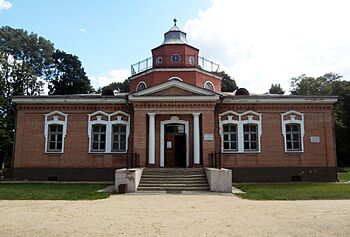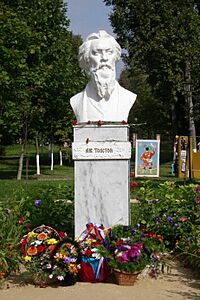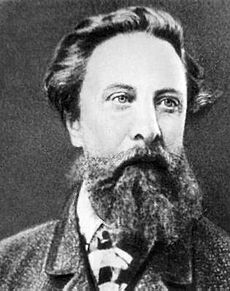Aleksey Konstantinovich Tolstoy facts for kids
Quick facts for kids
Aleksey Konstantinovich Tolstoy
|
|
|---|---|
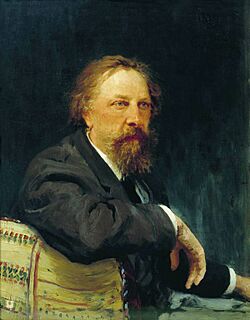
Aleksey Konstantinovich Tolstoy by Ilya Repin
|
|
| Born | 5 September 1817 Saint Petersburg, Russian Empire |
| Died | 10 October 1875 (aged 58) Chernigov Governorate, Bryansk Province, Russian Empire |
| Genre |
|
| Notable works | The Death of Ivan the Terrible Tsar Fyodor Ioannovich Tsar Boris Prince Serebrenni |
| Signature | |
Count Aleksey Konstantinovich Tolstoy (Russian: Граф Алексе́й Константи́нович Толсто́й; September 5, 1817 – October 10, 1875) was a famous Russian writer. People often called him A. K. Tolstoy. He wrote poems, novels, and plays.
He is known as the most important Russian historical playwright of the 1800s. His most famous works are a group of three plays: The Death of Ivan the Terrible (1866), Tsar Fyodor Ioannovich (1868), and Tsar Boris (1870). He also wrote funny stories and poems. Some of these were published under his own name, like History of the Russian State from Gostomysl to Timashev. Others were written with friends under the funny name Kozma Prutkov. His other works include the scary stories The Family of the Vourdalak and The Vampire. He also wrote the historical novel Prince Serebrenni (1862).
Aleksey was part of the important Tolstoy family. He was a second cousin to the famous writer Leo Tolstoy. Because his mother was close to the Tsar's family, Aleksey became a playmate for the young Crown Prince. This prince later became Tsar Alexander II.
As a young man, Tolstoy traveled a lot. He visited Italy and Germany. In Germany, he even met the famous writer Johann Wolfgang von Goethe. Tolstoy started learning at home. His uncle, the writer Antony Pogorelsky, taught him and encouraged him to write poetry. In 1834, Tolstoy began studying at the Moscow Foreign Ministry State Archive. He passed his exams in many subjects in 1835 at the University of Moscow.
During the 1840s, Tolstoy enjoyed a busy social life. He went on fun trips, attended parties, and went hunting. He also worked for the government as a diplomat. In 1856, Tsar Alexander II made Tolstoy one of his personal assistants. Tolstoy also served as an army major in the Crimean War. He eventually left government work in the early 1860s to focus on his writing. He died in 1875 at his home in Krasny Rog.
Contents
Biography
Early life and education
Aleksey Konstantinovich Tolstoy was born in Saint Petersburg. He came from the well-known Tolstoy family. His father was Count Konstantin Petrovich Tolstoy. His mother was Anna Alekseyevna Perovskaya. She was the daughter of Count Aleksey Kirillovich Razumovsky. Aleksey Konstantinovich was a second cousin to Leo Tolstoy.
His parents' marriage did not last long. They divorced in October 1817. Anna moved with her baby son to her brother Aleksey Perovsky's estate. This estate was called Krasny Rog. Aleksey Perovsky became Aleksey Konstantinovich's teacher and friend. He was also a writer, known as Antony Pogorelsky.
It is said that Pogorelsky's famous fairytale, The Black Chicken or The People of the Underground, was first told to young Aleksey. Because of his uncle, Aleksey started writing poetry very early, in 1823. He was inspired by old books he found at home. Aleksey had good teachers. By age six, he spoke French, German, and English very well. Later, he also learned Italian.
Aleksey loved his childhood at Krasny Rog. He later wrote:
I was raised by Aleksey Perovsky… I spent my first years at his estate. That is why I see Malorossia as my true home. My childhood was very happy. It left me with the clearest memories. I was my mother's only child. I had no friends to play with. But I had a strong imagination. From a young age, I was a dreamer. This soon turned into a love for poetry. The area helped this feeling. The air, the huge forests I loved so much, all made a big impression on me. They completely shaped who I am now.
In 1826, Aleksey's family moved back to Saint Petersburg. Because his mother was close to the Tsar's court, Aleksey became a playmate for the young Crown Prince. This prince would become Tsar Alexander II. Aleksey visited the Crown Prince in Saint Petersburg and Tsarskoye Selo. They took walks and played games together. Their friendship lasted for many years. In 1826, Aleksey also met Aleksander Pushkin for the first time.
In 1827, the family visited Germany. In Weimar, young Aleksey met Goethe. Goethe was very kind to the boy. He gave Aleksey a piece of a mammoth tusk with a drawing on it. Aleksey was amazed. He remembered little, only Goethe's "magnificent features" and how he held him. The family traveled a lot for the next ten years. A trip to Italy in 1831 especially impressed the 13-year-old. He felt very sad to leave Italy. In Italy, the family met the artist Karl Bryullov.
Starting his career
In 1834, Tolstoy began working at the Moscow Foreign Ministry State Archive. Here, he learned to work with historical documents. In 1835, he passed exams at the University of Moscow. This allowed him to become a state bureaucrat. He then started working in Saint Petersburg. In 1836, his uncle Aleksey Perovsky died. Tolstoy inherited his Krasny Rog estate.
In 1835, Aleksey showed some of his poems to Vasily Zhukovsky, who liked them. There is also a story that Pushkin approved of his early poems. Tolstoy wrote a lot but was not in a hurry to publish. He said his early poems were "absurd" but had perfect rhythm. He practiced for many years before publishing his first prose work.
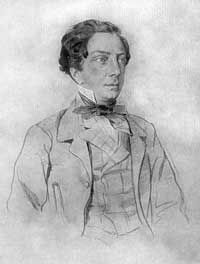
In 1837, Tolstoy joined the Russian Embassy in Frankfurt. He spent most of his time in Saint Petersburg, enjoying life and traveling. During these trips, he wrote two "gothic" stories: The Family of the Vourdalak and Three Hundred Years On. Tolstoy was very interested in scary things. His uncle, who loved mysticism, influenced him.
In 1840, Tolstoy moved back to Russia. He worked in the Tsar's Imperial State Chancellery. He slowly moved up in his job. But he became less excited about it. He felt it stopped him from writing. In May 1841, Tolstoy published his first novella, The Vampire. He used the pen name "Krasnorogsky," named after his home. This story was complex and mixed horror with political satire. It caught the eye of Vissarion Belinsky, a famous critic. Belinsky praised the "gifted author," not knowing who he was. Tolstoy thought the story was not important.
In 1843, Tolstoy's poem "Serebryanka" was published. In the 1840s, Tolstoy lived a busy social life. He was known as a "handsome young man" and was very strong. He could bend spoons and drive nails into walls with one finger. In 1850, he became good friends with Nikolai Gogol. He also became friends with other writers like Ivan Turgenev.
In the early 1850s, Tolstoy worked with the Zhemchuzhnikov brothers. They created a made-up writer named Kozma Prutkov. Prutkov was a small government worker who thought very highly of himself. He made fun of poetry and became famous for his silly sayings. In 1851, Prutkov's comedy The Fantasy was performed. It made fun of popular plays. The play caused a big scandal and was banned by Nikolay I.
In 1851, Tolstoy met Sophia Andreyevna Miller. She was married but later divorced her husband. Sophia was very smart and knew fourteen languages. Tolstoy fell in love with her. They had to wait twelve years to get married. Sophia had great artistic taste. Tolstoy said she was his best critic and friend. All his love poems from 1851 were about Sophia. Many of his poems became famous Russian songs.
In 1854, Sovremennik magazine published some of Tolstoy's poems. Critics immediately talked about them. The first funny poems by Kozma Prutkov also appeared. Prutkov was not just a pen name. He was a character who played jokes. One joke involved sending messengers to architects late at night. They were told that the Isaakiyevsky Cathedral had fallen down. The architects rushed to the Tsar, who was very annoyed.
When the Crimean War started, Tolstoy wanted to lead a fighting group. He helped pay for and equip two groups of fighters. He bought ammunition and explored the Baltic coastline. In 1855, he joined an army regiment as a major. His regiment went to Odessa. Many men died there from typhoid. In 1856, Tolstoy also got sick. Sophia Miller nursed him back to health. Tsar Alexander II asked for daily updates on his friend. In May 1855, Tolstoy recovered. The war was over for him. He then traveled with Sophia.
After the war, in 1856, Tsar Alexander II made Tolstoy his personal assistant. Tolstoy found this job tiring. It kept him from his writing. He managed to leave this job three years later. He wrote to Sophia: "You cannot imagine what a storm of rhymes rages in me, what waves of poetry are sweeping through me." Most of Tolstoy's poems were written in the late 1850s.
In 1857, a long poem called The Sinner was published. Then came Ioann Damaskin in 1859. This poem was about poetry and the poet's place in society. It caused a scandal. The head of the 3rd Department tried to stop its printing. But the Minister of Education allowed it.
Tolstoy's poems appeared in many Russian magazines. But his relationship with the leftist Sovremennik group became difficult. Tolstoy leaned towards the Slavophiles and their Russkaya Beseda magazine. He became friends with Ivan Aksakov. But this friendship also did not last long. In the 1860s, he was a popular writer. But he was criticized by both the left and the right.
Tolstoy knew why he was criticized. He wrote:
I dislike power that controls people. I also dislike false freedom that wants to tear down good things. Both of these are forms of tyranny. I also dislike the boring ideas of our so-called progressives. They say poetry should be useful. I am one of the few writers here who believes in Art for art's sake. I am sure that a poet's job is not to give people favors. It is to make them more moral. It is to fill them with a love for beauty. This love will find its own purpose. This idea goes against what most journals believe. So, they see me as a main example of what they oppose. They scold me with great passion. Our newspapers are mostly run by socialist thinkers. I am their target. But readers approve of my work. And here's a strange thing: journals call me "old-fashioned," but the government calls me "a revolutionary."
Tolstoy often criticized government officials. He saw them as enemies of the state, even though he supported the Tsar. He also criticized the 3rd Department. During the Polish uprising, he was one of the few at court to speak out against the harsh methods used by Muravyov.
He was against xenophobia (fear of foreigners). He believed Russia was a European country. This disagreed with the Slavophile idea that Russia was special. He also argued with Turgenev, who saw France as a guide for Russia. Tolstoy said, "What France is moving towards is the rule of average people."
Tolstoy was neither a Westernizer nor a Slavophile. He loved old Russian society before the Tatars. He saw it as a European type of knighthood. He also criticized the West's focus on money and socialist ideas. He disliked Russian imperial ideas. He believed a strong, central Russian state was good. But he saw the Moscovia State as the source of all Russian political problems. His ideas were unique and did not fit with other trends of his time.
Tolstoy did not agree with some church teachings. He believed in God as a "higher being" and a cosmic mind. He wrote: "I believe God gave us emotions so we could go further than our minds. Human emotion is better than a thought, just as music is more perfect than a spoken word."
Life after 1861
In 1861, Tolstoy left the Tsar's Court. He wrote to Alexander II: "I thought I could hide my artistic nature, but life taught me differently. This struggle was useless. Service and art do not mix." A historian wrote that Tolstoy was a rare person. He avoided honors and fought against people who wanted him to have a brilliant career.
After this, Tolstoy rarely visited the Palace. But when he did, he always "spoke the truth." In 1862, he helped Ivan Aksakov, who was banned from editing his newspaper. A year later, he helped Ivan Turgenev, who was exiled. In 1864, Tolstoy tried to get Alexander II to help the imprisoned Chernyshevsky. When the Tsar asked about literature, Tolstoy said, "All of Russia is sad for Chernyshevsky, who has been treated unfairly." The Tsar quickly replied, "No, Tolstoy, please never remind me of Chernyshevsky." This talk ended their forty-year friendship.
Tolstoy's historical novel Prince Serebrenni (1862) was very popular. It was set during the time of Ivan the Terrible. The novel was read at the Palace. The Empress, Maria Aleksandrovna, admired Tolstoy. His play Don Juan (1862) was less successful. It was not performed during his lifetime. It only appeared in theaters in 1905, with many cuts.
Besides Kozma Prutkov, Tolstoy wrote funny poems under his own name. The most famous was History of the Russian State from Gostomysl to Timashev (1868). This poem made fun of Russian history and its rulers. Another funny poem, The Dream of Councillor Popov (1873), became very popular. It spread around Russia in handwritten copies. Both Leo Tolstoy and Ivan Turgenev loved this poem. It made fun of the Interior Minister and conservative officials. The poem was published in 1878. In 1867, Tolstoy published Poems, a large collection of his verses. This was the only collection published while he was alive.
Tolstoy's most important contribution was his three historical plays. They were like Alexander Pushkin's Boris Godunov. The plays were: The Death of Ivan the Terrible, Tsar Fyodor Ioannovich, and Tsar Boris. The Death of Ivan the Terrible was published in 1866. It was performed in 1867 and was a huge success. But after 1870, it was almost banned. It was revived in the late 1890s. Tsar Fyodor Ioannovich (1868) was banned from the stage by the Interior Minister. Even in 1907, censors thought it was "inappropriate." Tsar Boris (1870) was not officially banned. But the Imperial Theatres refused to stage it. In 1871, Tolstoy started his last play, Posadnik. It was about the Novgorod Republic. He did not finish it. Parts were published in 1874, and the rest after his death in 1876.
Later life and death
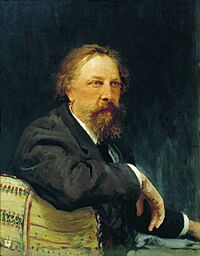
Tolstoy was a kind landowner. His peasants at Krasny Rog admired him. They could use his fields for grazing. He gave them free timber. He also built a school for their children in 1859. In 1861, he gathered his peasants. He read them the Emancipation reform of 1861 decree, which freed serfs. He gave money to everyone and celebrated with them.
Tolstoy spent a lot of money. He did not know much about managing money. By the late 1860s, he was almost bankrupt. But he did not want to return to the Tsar's Court.
From the mid-1860s, Tolstoy felt more and more alone in Russian culture. He called himself an "anchorite" (someone who lives alone). He spent most of his time at Pustynka and his Krasny Rog estate. His money problems and poor health added to his worries. He was tired of fighting his opponents. He felt disappointed with what he saw around him. In 1869, A. K. Tolstoy wrote to a friend:
I have decided that we do not deserve a Constitution. No matter how wild our rulers are, they are still better than the people they rule. The Russian nation is not worth much now… Yet we, who should be deeply ashamed, turn our backs on Europe. We announce "new beginnings" and dare to speak of "the rotting West"!… If God decided to give me another birth today and asked me what country I wanted to be born into, I would say: "Your Majesty! Put me anywhere you want, but not Russia again." When I think of our beautiful language and how wonderful our history was before the terrible Mongols came, I want to fall to the ground and cry in despair. I am mad at what we have done with all the talent God gave us.
A. K. Tolstoy entered the 1870s as a very sick man. He suffered from asthma, angina pectoris (chest pain), neuralgia (nerve pain), and bad headaches. Visiting doctors in Europe only helped for a short time.
Aleksey Konstantinovich Tolstoy died on September 28, 1875, in Krasny Rog. He was buried in the family tomb at the Uspenskaya Church in Krasny Rog.
Legacy and influence
Tolstoy was part of the later period of Romanticism in Russian literature. For him, art was a special link between humans and higher worlds. He believed art was a higher science. It was the only way for people to truly understand the world. His romantic ideas were best seen in his poetry and plays. In Don Juan, the hero searches for a perfect ideal. He looks for love that "helps one understand the wonderful universal laws." Tolstoy wrote in 1870 that art "contains all its own purposes." These views made him seem "conservative" to many writers of his time.
Unlike some others, Tolstoy believed artists should be completely free from politics. He felt free to criticize authorities. This annoyed many powerful people.
Tolstoy's poetry had special qualities. One was its "half-spoken" nature. He explained that it was good for poetry when a thought was only partly finished. This allowed readers to complete it in their own way. He was sometimes criticized for "bad rhymes." But he used them on purpose. He felt that small imperfections could create special effects. In reality, Tolstoy was a master of writing verse. His "careless" rhymes made his poems sound natural. But he worked hard on them. A critic wrote that Tolstoy's verse was simple but still very poetic. His poems also mixed formal language with everyday talk and Russian folklore. This gave his verse a unique, musical quality. More than half of Tolstoy's poems have been set to music by famous Russian composers. These include Tchaikovsky, Rimsky-Korsakov, and Musorgsky. Tchaikovsky called Tolstoy "the unfathomable well of poems crying for music."
D. S. Mirsky, a critic, said Tolstoy was balanced and clear in his poetry. He was "the least tragic, least disharmonious of the Russian poets." Mirsky also said his poems, even if sometimes sentimental, still felt fresh and delightful.
Innokenty Annensky saw Tolstoy's poetry as expressing "pure love." He believed the poet's ideal was "the human soul's inner beauty." Annensky wrote that Tolstoy's clear, mystical idealism appealed to teenagers. He said Tolstoy created a beautiful image of a noble woman in his poems.
Tolstoy's ballads and songs were similar to traditional Russian folk tales (bylinas). He did not see a difference between them. Critics said Tolstoy used folklore to share his own ideas. He used stories from Russian history to talk about current social issues. He often made Russia's past before the Mongols seem perfect. He made folk heroes like Ilya Muromets seem kind and graceful.
Critic Yuly Aykhenvald thought Tolstoy's focus on national history was too much. He quoted Anton Chekhov saying Tolstoy "put the opera costume on and forgotten to take it off." But Aykhenvald also said Tolstoy's humor stopped him from being too serious about history. He saw Tolstoy's romanticism as universal and religious. He believed Tolstoy's character Tsar Fyodor was a perfect example of Christian kindness.
Tolstoy's humor was best seen in Kozma Prutkov's sayings. It was also in his own funny poems. Mirsky called Tolstoy "Russia's greatest absurdist poet." The Dream of Councillor Popov and History of the Russian State from Gostomysl to Timashev were his most famous satires. They were very popular. Mirsky called The Dream "the peak of Russian humorous poetry."
Tolstoy's jokes against left-wing ideas were criticized by the "democratic" press. His "Ballad With a Tendency" was strongly criticized.
Tolstoy was a master of prose. His novella The Vampire and novel Prince Serebrenni received good reviews. Some critics said Prince Serebrenni was too biased. They felt the characters seemed more like 19th-century people than 16th-century ones. However, the novel showed Ivan Grozny and the terrible oprichnina (Ivan's secret police) very vividly. Its structure and language made it a great book for young people. Still, Tolstoy had less impact as a prose writer than as a poet.
He is praised as a classic writer of 19th-century Russian historical drama. D. S. Mirsky thought Tolstoy was a better playwright than Aleksander Ostrovsky. He described Tolstoy's plays as "full of intriguing ideas and brilliantly crafted characters." He said Tsar Fyodor had one of the most interesting characters in Russian literature. This was a kind but weak ruler who wanted justice but could not make his evil helpers do good.
Critics noted that history was secondary to Tolstoy. He used his own views and feelings. He judged 16th-century characters using 19th-century moral values. Tolstoy himself admitted that "the life of today seeps through everywhere" in his ballads. He believed historical drama only needed to be "true" in a "humanist way." He felt a poet's only responsibility was to their own poetic self. Historical truth was not binding.
Tolstoy's plays had hidden meanings that related to current political situations. But they were mostly driven by his historical views. He praised Russian "noble men" (boyars) and criticized Ivan Grozny.
Pavel Annenkov said Tolstoy's characters Ioann and Fyodor were "loosely based upon" real people. But they perfectly represented their era. He said Tolstoy's plays were truly historical because they showed the spirit of old Russia.
The three plays in the trilogy looked at the history of Russian rulers. Tolstoy believed that efficient rulers were evil, and good ones were not effective. All three stories had similar lessons. For example, Tsar Fyodor says, "I am to blame for all of this... Oh God, why did you make me Tsar?!" All three plays had problems with censorship. The trilogy continued to divide opinions in Russia until 1917.
All three plays became part of the main Russian theaters' performances. Tolstoy, as a dramatist, was seen as better than his contemporaries. He created complex historical figures. Tolstoy wrote: "In the arts, to be afraid of showing weaknesses in your favorite characters is to do them a bad service... This only creates dull characters that no one would believe in."
In the mid-19th century, Tolstoy was not taken very seriously. But his reputation grew after his death in 1875. Vladimir Korolenko called Tsar Fyodor Ioannovich "a gem of Russian drama."
Tolstoy was highly valued by Aleksander Blok and Valery Bryusov. Ivan Bunin rated him very high. Velemir Khlebnikov mentioned him as a favorite. And, surprisingly, Vladimir Mayakovsky knew his poetry by heart. Both Tolstoy's poetry and his historical plays are considered important parts of classic 19th-century Russian literature.
Selected works
Plays
Stories
|
Poems
|
See also
 In Spanish: Alekséi Konstantínovich Tolstói para niños
In Spanish: Alekséi Konstantínovich Tolstói para niños
 | William L. Dawson |
 | W. E. B. Du Bois |
 | Harry Belafonte |


